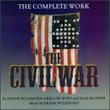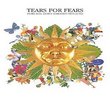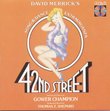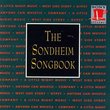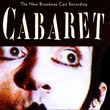| All Artists: Michael John LaChiusa Title: Hello Again (1994 Original Broadway Cast) Members Wishing: 0 Total Copies: 0 Label: RCA Victor Broadway Original Release Date: 6/28/1994 Release Date: 6/28/1994 Album Type: Cast Recording Genres: Pop, Soundtracks, Broadway & Vocalists Style: Musicals Number of Discs: 1 SwapaCD Credits: 1 UPCs: 090266268023, 090266268047 |
Search - Michael John LaChiusa :: Hello Again (1994 Original Broadway Cast)
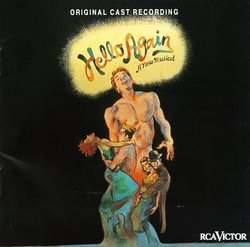 | Michael John LaChiusa Hello Again (1994 Original Broadway Cast) Genres: Pop, Soundtracks, Broadway & Vocalists
|
Larger Image |
CD DetailsSimilarly Requested CDs
|
CD ReviewsA Subtly Brilliant Musical Jason D. Witte | Kansas City, MO | 12/07/1999 (5 out of 5 stars) "Upon a first (and, indeed, a second and even third) listening, I found myself strangely unaffected by LaChiusa's score, with the exception of 'Tom' and 'Mistress of the Senator'. However, I persisted in not giving up in disappointment, and "Hello Again" gradually yielded its subtle brilliance.In order to fully appreciate what LaChiusa accomplishes, I think it is necessary to keep in mind that "Hello Again" is an exploration of sexual conquest. In Scenes One through Four, there seems to be little consequence for either the predator or the prey; the predator attains what he or she was after, and the prey has lost his or her innocense and naivety when it comes to sexual intercourse. Indeed, there is the undercurrent of a playfullness to the eroticism. But there is an interesting shift in Scene Five. The Young Wife is engaging in sexual intercourse with the Husband, but is fantasizing about a total stranger that she had a brief dalliance with. Whereas in Scenes One through Four, the acts of intercourse were simply for the pleasure, the feeling of love is added to the act.Scene Six returns to the idea of sexual intercourse as being for pleasure alone, but it ends in disaster: the predator (The Husband) dies, while the prey (The Young Thing) escapes to live. Scene Seven adds another twist. Scenes One through Six began with the sexual predator looking strictly for pleasure, with the Young Wife in Scene Five finding love encroaching on the pleasure. In Scene Seven, the Writer may be cruising in a gay bar, but he is looking for love, which becomes quite evident when he and the Young Thing end up together in bed. However, the Writer so idealized love and its connection with sexual intercourse that he is ultimately isatisfied. Scene Eight continues the idealized notion of love and sex from Scene Seven, with even more disastrous results for the Writer: he ends up being the prey instead of the predator.In Scene Nine, the Actress is interested in sex as power, and attempts to wield it over the Senator, who isn't won over. This comes across as the final nail in the coffin of sexual intercourse as being purely for pleasure.Finally, in Scene Ten, comes the balance between sexual intercourse for pleasure and sexual intercourse as an act of love. The Whore, whose livelihood comes in providing sex for pleasure, finds that there is something more in the act with the Senator. There is an honest tenderness in Scene Ten that was absent in Scenes One through Nine. Neither the Senator nor the Whore comes across as either sexual predator or prey, and as the scene ends, we see the seeds of an honest relationship being planted. As the Senator and the Whore embrace, the rest of the company appears, still unsatisfied with what they have experienced.Now, I don't mean "Hello Again" to sound so intellectually demanding as to be un-entertaining. On the contrary, this is one of the most humorous musicals I have ever heard. In particular, the scene between the Young Wife and the College Boy is laugh-out-loud funny, as the Young Wife attempts to bring the College Boy to climax in a movie theatre. As I said at the outset, "Hello Again" can be a disappointment, even after initial repeated listenings. But by carefully following the lyrics and stage directions in the libretto, I think that "Hello Again" will prove to be one of the most important musicals of the new generation of Sondheim-influenced composers." A moving look at love and lust Jena Tesse Fox | New York, NY USA | 01/24/2003 (5 out of 5 stars) "This is arguably Michael John LaChiusa's finest musical, and the recording more than does the show justice. Characters come vividly to life in each song, and as the lyrics sharply point out what they think they want, the music subtley evokes their hidden desires. The opening sweet-yet-weary siren song of a prostitute grows into a hot and bothered jazz seduction by a jaded soldier, which in turn becomes the stacatto domination of a young college boy... And so on, until the circle is complete, and everyone says "Hello, again." There is not a weak link in the wonderful ensemble cast, and the album has the unexpected bonus of featuring many stars before they were well-known. It would be almost impossible to get Donna Murphy, Carolee Carmello, Malcolm Gets, John Cameron Mitchell, Michele Pawk, John Dossett and Judy Blazer to do a show like this today, so it is doubly delightful to hear them together on this recording.Even in 1994, Michael John LaChiusa was proving himself to be a rising star among theatrical composers. His music for this show aptly displays why he has amassed such a devoted following among theatre enthusiasts." We may never be saying... Hello Again. jbhapgood2 | 06/06/2001 (5 out of 5 stars) "It's not your typical broadway musical. There's no kicklines. There's no helicopters, barricades or giant chandeliers (thank God!) But there is honest human emotion. There are believable characters. There are hummable songs, and intriguing lyrics. Hello Again is based on "La Ronde" and while you may not think that that would be a great source for a musical... You'd be surprised!!! The musical takes you on a journey from the first notes to the last "Hello, Again" and it's wonderful.The performances on the cd are very entertaining as well. Carolee Carmello, Michelle Pawk, Donna Murphy are all three women who are now major players in Broadway musical. (Donna Murphy won a tony, Carolee was nominated, and Michelle is a Drama Desk Nominee.) It also features Malcolm Gets from "Caroline in the City Fame" and John Cameron Mitchell (Hedwig and the Angry Inch creator). It's a must-have and I reccomend it to everyone."
|

 Track Listings (10) - Disc #1
Track Listings (10) - Disc #1
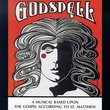
![Seussical [2000 Original Broadway Cast]](https://nationalbookswap.com/cd//m/02/4802/514802.jpg)
